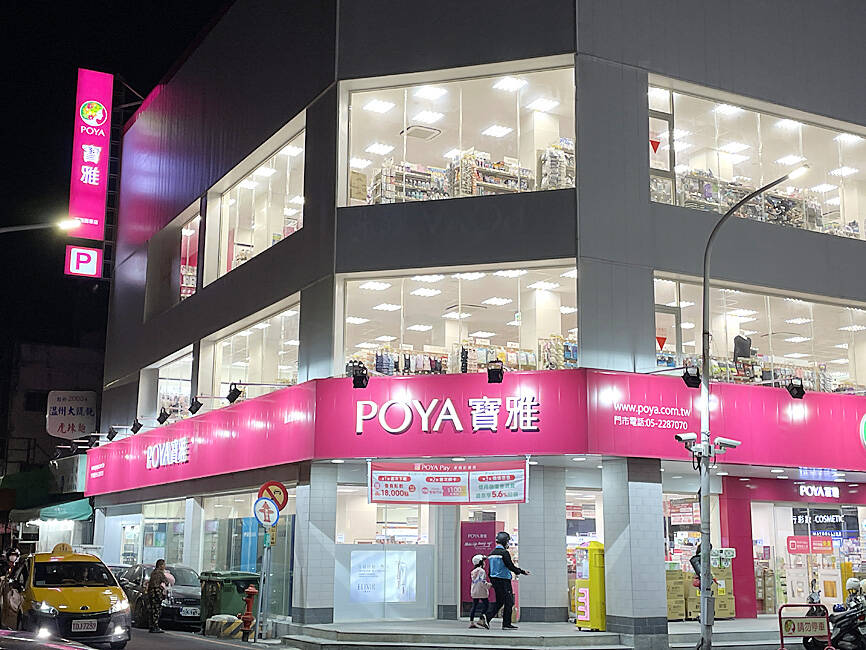Beauty and daily merchandise retailer Poya International Co (寶雅國際) yesterday reported better-than-expected profit for the second quarter, as high-margin cosmetics and efficient cost controls further lifted the firm’s gross margin.
Poya posted NT$589.08 million (US$17.92 million) in net profit for the April-to-June quarter, up 23.98 percent from NT$475.13 million a year earlier.
That translated into earnings per share (EPS) of NT$5.61, up from NT$4.55 the previous year, the company said in a regulatory filing.

Photo: Amy Yang, Taipei Times
Gross margin was also better than expected at 43.87 percent in the second quarter, up 2.48 percentage points from a year earlier, while operating margin rose 1.06 percentage points to 12.35 percent after consolidated sales increased 6.57 percent year-on-year to NT$5.63 billion, company data showed.
Fubon Securities Investment Services Co (富邦投顧) earlier said it had expected Poya to post second-quarter earnings of NT$5.4 per share, gross margin of 43.5 percent and operating margin of 12.4 percent.
In the first half of the year, Poya’s net profit grew 13.9 percent year-on-year to NT$1.29 billion, with EPS of NT$12.31, as revenue increased 8.8 percent to NT$11.5 billion.
Gross margin and operating margin improved to 44.07 percent and 13.73 percent respectively from 43.07 percent and 13.52 percent, company data showed.
“Benefiting from accelerated store expansion and improved beauty store and store-in-store deployments, the company’s same-store sales are expected to maintain positive growth, which would further lift its operating margin and achieve double-digit percentage growth in profit,” Fubon Securities said in a note.
The “store-in-store” concept refers to a separate shopping area within a larger store that features products from a specific brand, with Poya and the brands benefiting from cost and product arrangements.
The retailer is one of the nation’s major distributors of cosmetic and skincare products. As of the end of last month, it operated 380 namesake stores, including 50 “Poya Beauty” flagship stores and 22 “store-in-store” concept shops, as well as 10 Poya Home hardware outlets.
The company launched 15 new stores in the first half of this year and is expected to open another 40 new stores in the second half, aiming to expand its operating scale to more than 400 cosmetics outlets by the end of this year. It hopes a larger operating scale could help it expand total sales and maintain its leading position among Taiwan’s cosmetics distribution channels.

CAUTIOUS RECOVERY: While the manufacturing sector returned to growth amid the US-China trade truce, firms remain wary as uncertainty clouds the outlook, the CIER said The local manufacturing sector returned to expansion last month, as the official purchasing managers’ index (PMI) rose 2.1 points to 51.0, driven by a temporary easing in US-China trade tensions, the Chung-Hua Institution for Economic Research (CIER, 中華經濟研究院) said yesterday. The PMI gauges the health of the manufacturing industry, with readings above 50 indicating expansion and those below 50 signaling contraction. “Firms are not as pessimistic as they were in April, but they remain far from optimistic,” CIER president Lien Hsien-ming (連賢明) said at a news conference. The full impact of US tariff decisions is unlikely to become clear until later this month

With an approval rating of just two percent, Peruvian President Dina Boluarte might be the world’s most unpopular leader, according to pollsters. Protests greeted her rise to power 29 months ago, and have marked her entire term — joined by assorted scandals, investigations, controversies and a surge in gang violence. The 63-year-old is the target of a dozen probes, including for her alleged failure to declare gifts of luxury jewels and watches, a scandal inevitably dubbed “Rolexgate.” She is also under the microscope for a two-week undeclared absence for nose surgery — which she insists was medical, not cosmetic — and is

GROWING CONCERN: Some senior Trump administration officials opposed the UAE expansion over fears that another TSMC project could jeopardize its US investment Taiwan Semiconductor Manufacturing Co (TSMC, 台積電) is evaluating building an advanced production facility in the United Arab Emirates (UAE) and has discussed the possibility with officials in US President Donald Trump’s administration, people familiar with the matter said, in a potentially major bet on the Middle East that would only come to fruition with Washington’s approval. The company has had multiple meetings in the past few months with US Special Envoy to the Middle East Steve Witkoff and officials from MGX, an influential investment vehicle overseen by the UAE president’s brother, the people said. The conversations are a continuation of talks that

CHIP DUTIES: TSMC said it voiced its concerns to Washington about tariffs, telling the US commerce department that it wants ‘fair treatment’ to protect its competitiveness Taiwan Semiconductor Manufacturing Co (TSMC, 台積電) yesterday reiterated robust business prospects for this year as strong artificial intelligence (AI) chip demand from Nvidia Corp and other customers would absorb the impacts of US tariffs. “The impact of tariffs would be indirect, as the custom tax is the importers’ responsibility, not the exporters,” TSMC chairman and chief executive officer C.C. Wei (魏哲家) said at the chipmaker’s annual shareholders’ meeting in Hsinchu City. TSMC’s business could be affected if people become reluctant to buy electronics due to inflated prices, Wei said. In addition, the chipmaker has voiced its concern to the US Department of Commerce